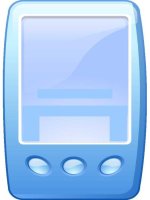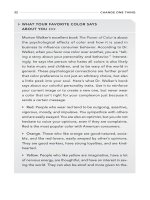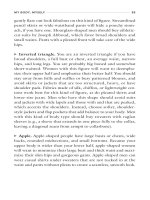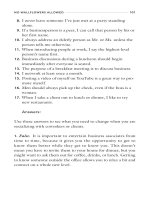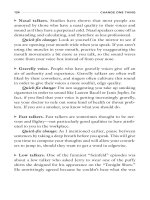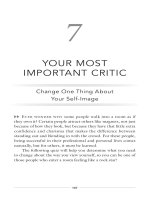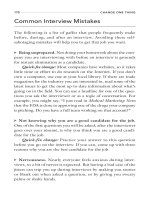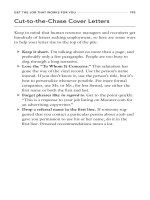Change One Thing Discover Whats Holding You Back and Fix It With the Secrets of a Top Executive Image Consultant_8 potx
Bạn đang xem bản rút gọn của tài liệu. Xem và tải ngay bản đầy đủ của tài liệu tại đây (336.9 KB, 23 trang )
170
change one Thing
Common Interview Mistakes
The following is a list of gaffes that people frequently make
before, during, and after an interview. Avoiding these self-
sabotaging mistakes will help you to get that job you want.
Being unprepared.
Y
Not doing your homework about the com-
pany you are interviewing with before an interview is grounds
for instant elimination as a candidate.
Quick‑fix change: Most companies have websites, so it takes
little time or effort to do research on the Internet. If you don’t
own a computer, use one at your local library. If there are trade
magazines for the industry you are interested in, read some of the
latest issues to get the most up-to-date information about what’s
going on in the field. You can use a headline for one of the ques-
tions you ask the interviewer or as a topic of conversation. For
example, you might say, “I just read in Medical Marketing News
that the FDA is close to approving one of the drugs your company
is pitching. Do you have a full team working on that account?”
Not knowing why you are a good candidate for the job.
Y
One of the first questions you will be asked, after the interviewer
goes over your résumé, is why you think you are a good candi-
date for the job.
Quick‑fix change: Practice your answer to this question
before you go on the interview. If you can, come up with three
reasons why you are the best candidate for the job.
Nervousness.
Y
Nearly everyone feels anxious during inter-
views, so a bit of nerves is expected. But having a bad case of the
jitters can trip you up during interviews by making you stutter
or blank out when asked a question, or by giving you sweaty
palms or shaky hands.
geT The JoB ThaT Works For You
171
Quick‑fix change: If you get the flop sweats at interviews,
make sure to wear a jacket or blazer to cover your perspiration.
You should also arrive extra early to the interview, so you have
time to go to the rest room and compose yourself. Go into a stall,
and take five deep breaths to slow down your heart and racing
mind. Do not drink caffeine before the interview; it will worsen
the shakes and stutters. One technique I use when nervous is to
do a silent scream in a rest room stall. Pretend you are underwater,
and let out the tension without making a sound. It works for me!
Monopolizing the conversation.
Y
While the interviewer is
eager to hear your thoughts, be careful not to interrupt too
often or monopolize the conversation.
Quick‑fix change: Allowing the other person time to speak
not only is respectful, but also will give you time to think about
what you are going to say next. In addition, it provides fodder
for questions about the position you are interested in. It’s OK to
pause once in a while and let your words sink in.
Giving one-word answers.
Y
Being too reticent during an
interview will make you appear like a new car that has run out of
gas. One-word answers leave gaps of silence, which are uncom-
fortable for both parties.
Quick‑fix change: The only way your interviewer can get
a fix on you, other than by reading your résumé, is by hear-
ing what you have to say and how you say it, so speak in full
sentences. You can always repeat the question if you need some
extra time to gather your thoughts.
Lying.
Y
Not answering an interviewer’s question by skirting
the topic, rambling, or being vague is a red flag for employers.
Quick‑fix change: Don’t try to fudge your way through a
difficult question. Say, “I’m not familiar with this subject.” (See
my interview prep sheet later in this chapter.)
172
change one Thing
Showing little enthusiasm for the job.
Y
I can’t tell you how
many employers have complained to me about candidates who
sleepwalk through their interview. Employers want to know that
a candidate is excited about a job and will be happy coming to
work each day.
Quick‑fix change: If you are going for a job that you really
want, show it in your voice and demeanor. Let the employer
know your interest by saying straight out that you are impressed
with the company and would be excited to work there. Enthusi-
asm will often trump experience when all else is equal.
Being too modest.
Y
Job interviews are not the place for mod-
esty. They are a time to trumpet your successes and to let employ-
ers know why you are good at what you do.
Quick‑fix change: Go over your past job triumphs before
your interview, so they are fresh in your mind. Bring a portfolio
of your work with you, if you have documents that back up your
triumphs, and do a show-and-tell. Make sure to include how
your work helped the company’s bottom line, if applicable.
Poor appearance and body language.
Y
I’ve written entire
chapters on both, so if you’ve read Chapters 2 and 6, you should
know what to do if these are issues for you.
Quick‑fix change: Dress appropriately for the industry you
are interviewing for. Don’t slouch. Make eye contact, and be
open and friendly in your demeanor, which means smiling and
keeping your arms uncrossed.
Not understanding all aspects of the job.
Y
Frequently, people
interview for jobs they are unqualified for. Then they are blind-
sided when an interviewer asks about skills they don’t have.
Quick‑fix change: Make sure to do the proper research on
the job you are going for, so you know exactly what skills are
involved.
geT The JoB ThaT Works For You
173
Bad-mouthing a former employer.
Y
It’s a small world, so you
never know if your former boss is friends with your interviewer.
If you rant about your current or former job, the interviewer will
conclude that you’ll do the same thing if this position doesn’t
work out.
Quick‑fix change: No matter how bad your current or for-
mer employer was, resist the temptation to vent during your
interview. If asked why you want to move, say you are looking
for new challenges, and keep it at that.
Being defensive.
Y
If your interviewer throws you a curveball
by bringing up something negative that happened to you in the
past, try not to react defensively.
Quick‑fix change: Look at these difficult questions as an
opportunity to put a good spin on a bad experience, so talk
about what you learned from it and how it helped you grow as a
professional.
anna’s Tips For successFul inTerVieWing
Y YYY
Prepare yourself by doing research in advance.
Y
Dress appropriately for the position.
Y
Treat each interview as an opportunity to get to know the
Y
employer.
Approach each interview as a chance to advance your
Y
career.
Keep an open mind about what others have told you
Y
about the company.
Don’t live in the past. Even if you were not successful in a
Y
previous interview, you still might succeed in the next one.
Continued
174
change one Thing
The Salary Question
Asking about salary is one of the most difficult parts of the
interview process. Most people are uncomfortable talking about
money, and it is a sensitive issue for employers as well, especially
Always be yourself. If you are turned down for a job
Y
based on personality differences, it’s not the right job for
you.
Don’t be modest; sell yourself by preparing two success
Y
stories to tell.
Have a good opening statement about yourself.
Y
Link your previous experience with what’s needed for the
Y
job.
Turn negative experiences into a positive by figuring out
Y
what you learned from them.
Make eye contact, and have a strong handshake.
Y
Match the energy of the interviewer.
Y
Stay calm if the interview isn’t going well; there will be
Y
others.
Avoid personal details that are irrelevant to the position.
Y
Maintain a positive attitude.
Y
Record a video of yourself being interviewed. This will
Y
help you fix any negative body language and facial
expressions. It will also help you tamp down any nervous
energy or ramp up your enthusiasm if your energy level is
low.
geT The JoB ThaT Works For You
175
in bad economic times. Try to keep in mind that your self-worth
is not connected to your net worth, so if you are not making
as much as you think you deserve, it doesn’t mean you are less
valuable as a person.
Be prepared to answer the question of how much you cur-
rently make, because this figure will be the basis for how much
you will be offered. Try to avoid this question, if possible, by
saying you are making a salary compatible with your title and
experience. If pressed, round up to the nearest high figure, but
say that you are looking to go up a pay grade in your new job.
In the following situations, you can expect that your salary
history will be requested during the interview process. For each
situation, I’ve suggested ways to respond:
Applications.
Y
If your application requests a salary history,
you can either ignore that section or write that you would like
to discuss salary in person, so you get to the next step of a face-
to-face interview. In some instances, however, you will not be
considered unless you provide your current salary. But if your
background is a perfect fit for the job you are applying for, often-
times the employer will ignore the request on the application
and call you in for an interview.
Interviewer questions.
Y
If an interviewer asks how much you
are looking for, try to delay the discussion of salary as long as
possible, or keep your answer vague, such as “My total compen-
sation package was in the low six figures.” If you must answer
directly, give a range instead of a solid figure: “Somewhere
between $50,000 and $70,000,” with the low figure being an
amount that is acceptable to you. If the salary offered is below
what you want, be ready to walk away from the offer if you
176
change one Thing
intend to negotiate for a higher salary. If you really want or need
the job, say something like, “My compensation is not as impor-
tant as my finding a good fit,” or, “That would work, if there
are possible bonuses and six-month salary reviews.” If the hiring
manager really wants you, he or she will find a way to sweeten
the pot so you will take the job.
Recruiter questions.
Y
If you are working with a recruiter, this
person is likely to ask what you are looking for. It is in the recruit-
er’s best interest for you to make as much as possible, because
the recruiter will take a percentage of your annual salary at the
new job as a fee. That said, it is also important to recruiters not
to offer a candidate who will then turn around and refuse the
job because of a salary dispute. You must be honest with a head-
hunter about your minimum salary requirements.
Your Interview Preparation Worksheet
Fill out the following questionnaire before your next interview,
so you will be prepared if these questions arise:
What are your qualifications for the job, including your edu-
cational background?
geT The JoB ThaT Works For You
177
What job skills do you have that will help in this position?
Describe some of your professional success stories.
How would you describe your personality and character?
What are some of your outside interests?
178
change one Thing
What are your strengths?
What are your weaknesses?
Why should we hire you?
What decision did you make in the past year that you are
proud of? Why?
geT The JoB ThaT Works For You
179
What decision did you make in the past year that you wish
you could change? Why?
Give an example of a time when you managed a conflict with
a coworker.
Describe a current project you are working on and how it is
going.
Why do you want to leave your current job?
What are your salary requirements?
180
change one Thing
Interview Survival Kit
Bring the following items with you to the interview:
Breath mints
Y
Extra shirt or blouse (in case you spill something or sweat
Y
too much). This should be in your car or at your hotel
nearby, or you can hang it in the coat closet in the waiting
room.
Extra pair of hose (if you are wearing a skirt)
Y
Comb, brush, and makeup
Y
inTerVieW preparaTion checklisT
Y YYY
Use this quick prep checklist before going on your next
interview:
I researched the job opening, including details of the )
main duties and what the manager is looking for.
I developed a strategy for the interview, and I know the )
name and proper spelling of the person I will be meeting.
I have made a list of my qualifications that make me the )
best candidate for the job.
I know at least two success stories that will convey my )
qualifications.
I’ve practiced my introduction and my success stories. )
I have a list of questions to ask the interviewer. )
I have spoken to someone who can give me information )
about the position I’m applying for.
My interview outfit is ready to wear and in mint condition. )
I know how to get to my interview. )
geT The JoB ThaT Works For You
181
Making a Short Presentation
Sometimes you will be asked to make a short presentation if the
position you seek requires you to do public speaking, sales, or
pitching to potential clients. The following checklists will help
you to prepare for a knockout presentation:
Planning
Arrange your material in the order in which you will be
Y
presenting it.
Explain your three key points.
Y
Rehearsing
Practice what you want to say out loud until you are comfortable
with expressing your key points and timing. Practice in front of:
A mirror or video recorder, so you know how you look.
Y
Friends or relatives. Ask for feedback, both positive and
Y
negative.
A clock or timer, so you stay within your allotted time
Y
limit.
Presenting
If you are using visual aids, don’t let them upstage you—it’s you
doing the talking, not the visual aids. Do remember to:
Engage the audience by making eye contact.
Y
Stand up when giving your presentation.
Y
Keep your message simple and direct.
Y
Use handouts to illustrate your points, if applicable.
Y
Try to relax and have fun by injecting humor into the pre-
Y
sentation, if appropriate.
182
change one Thing
Dressing Mistakes to Avoid
at an Interview
Some general rules define what to wear at an interview. A good
starting point is that whenever you are in doubt, you should err
on the more conservative side. Despite the differences in various
regions (for example, New York is more formal, and Califor-
nia more laid-back) and the variety of corporate cultures based
on industries (financial and legal are more conservative, while
advertising, technology, and publishing are more informal), the
professional wardrobe has begun to strike a happy medium.
Interview clothes can reveal a bit about who you are or aspire
to be, but they should not stand out by being unusual or quirky.
Remember, the interviewer is more interested in what you are
saying than what you are wearing, so you want him or her to
focus on you, not your clothes. This is not the time to make a
fashion statement. Here are common wardrobe faux pas to avoid
when you are going on an interview:
Wild nail polish.
Y
Extremely long nails are a turnoff, as are
decals or wild-colored nail polish. Stick with clear, light
pink or subdued red. Men should get a manicure before an
interview so their nails look cut and polished.
Jewelry that jangles.
Y
Don’t wear more than two rings
on one hand or more than one earring per ear. Abso-
lutely no face jewelry or ankle bracelets are appropriate for
interviews.
Open-toe shoes, backless shoes, or stilettos.
Y
Make sure
your shoes are closed and that the heel is no higher than
two inches. Your shoes should be in great condition and
up-to-date in terms of style.
geT The JoB ThaT Works For You
183
Bare legs.
Y
Most women hate pantyhose, but I’m afraid we
must wear them on an interview, even if our legs are tan
and even if the weather is hot. Stockings should be neutral
colors or match your shoes—no fishnets or seams.
Out-of-date suits.
Y
Suits with lapels that are too wide (three
inches or more) or too narrow (one inch or less) should be
retired. If you don’t want to get rid of them, a good tailor
can alter the lapels for you.
Short skirts.
Y
If you’re wearing a skirt, your hem should
not be more than three inches above the knee. Do not wear
capri pants or leggings to an interview.
Leather jackets.
Y
Save the leather for your leisure time.
Short-sleeved shirts.
Y
Interview shirts should always have
long sleeves and a collar. No turtlenecks, please.
Printed or trendy handbags.
Y
Purses, like your dress,
should be conservative and inconspicuous. Interviews are
not the time to show off your $2,000 purple Fendi.
Red briefcases.
Y
Briefcases also should be conservative in
color and always in top condition. Stick to black or brown
leather.
Carrying a backpack or fanny pack.
Y
These kinds of totes
are meant for casual places like the gym, school, or travel.
Wearing your sunglasses on your head.
Y
Take your sun-
glasses off when you arrive, and put them in a case, not
on your head or folded on your shirt. Unless you’re Anna
Wintour or Jack Nicholson, never wear sunglasses indoors.
A cheesy tie.
Y
Ties should be made of silk, no less than
three and a quarter inches wide, with a conservative pattern
that complements the color of your dress shirt. Powerful
colors include red and burgundy.
Overly bright or patterned clothing.
Y
Keep it simple, and
no stripes or flowers!
184
change one Thing
Too much makeup.
Y
Wear a neutral-color lipstick and no
eye shadow or false lashes.
Unnatural hair color or comb-overs.
Y
Women should
make sure their hair has been recently styled. Men who
are bald or have a receding hairline should shave their hair
close to the head, rather than comb it over. Never, ever
wear a toupee!
Too much perfume or aftershave.
Y
Your interviewer should
not smell you before and after you leave a room. Some
people are allergic to fragrances; if you must wear one,
make sure it is subtle.
Belts and shoes that don’t match.
Y
Your belt and shoes
should always be made of leather and match in color. The
best colors for men are black or cordovan.
Tags on your clothes.
Y
It’s great to wear a new suit or outfit
to an interview, but don’t forget to take the tags off. Like-
wise, remove all extra buttons, and remember to cut the
zigzag thread that keeps pockets and slits closed.
Stains.
Y
Check your clothing for stains several days before
your interview, so you have time to get them cleaned.
Sample Interview Questions
(Practice Test)
Before your next interview, ask yourself (or get a friend to ask
you) the following frequently asked interview questions, so you
will be prepared with your best possible answers.
Tell me about yourself.
Y
Why did you leave your last job?
Y
geT The JoB ThaT Works For You
185
Do you know anything about our company?
Y
What did you like about your last job?
Y
What would you like to be doing five years from now?
Y
Can you work under pressure?
Y
Could you describe a difficult problem and how you dealt
Y
with it?
Why do you want to work here?
Y
What were some of the things you did not like about your
Y
last job?
What do you consider your most significant weaknesses?
Y
What are your biggest accomplishments?
Y
How do you accept criticism?
Y
What is the most difficult situation you have faced?
Y
What are some of the things that bother you?
Y
What do you consider your most significant strengths?
Y
Do you prefer working with others or alone?
Y
How do you get along with different types of people?
Y
Can you give me an example of a project that didn’t work
Y
out well?
What are some of the things you and your supervisor have
Y
disagreed on?
Ten Questions to Ask the Interviewer
Most interviewers will allow the applicant to ask questions about
the company or job he or she is applying for, so be prepared with
at least one or two questions. Here are some suggestions:
How would you describe the duties of this job?
Y
What are some of the biggest challenges of this position?
Y
186
change one Thing
What do you like best about working at this company?
Y
What are some of your company’s goals for the future?
Y
How would you describe the ideal candidate for this job?
Y
How would you describe the corporate culture here?
Y
Why did the person I would be replacing leave?
Y
May I talk to the person who had this job before me?
Y
What are the opportunities for growth in this position?
Y
Is there anything else I can tell you about my
Y
qualifications?
The Follow-Up
It is imperative that you follow up with a thank-you note by let-
ter or e-mail within two days after an interview. The note serves
several purposes:
Showing appreciation for the employer’s time and interest
Y
Reiterating your interest in and enthusiasm about the orga-
Y
nization and position
Providing information you forgot to mention during your
Y
interview
Following up with any information the employer might
Y
have asked you to provide
If more than a week has passed since you were told you
would hear something from the employer about a decision, call
or e-mail to inquire about the status of the position. A polite
inquiry shows that you are still interested, and it might prompt
the interviewer to make a decision or schedule additional inter-
views with others in the company, if necessary.
geT The JoB ThaT Works For You
187
Sample Follow-Up Letter
Here is an example of a good, basic follow-up thank-you letter.
Use this as a guide, and add your own personal touches:
Thank you again for the opportunity to meet with you. I
enjoyed learning more about [company name], and the inter-
view has confirmed my strong interest in becoming a part of
your team. As I mentioned, the position described sounds like
an excellent fit with my skills and experience. Please let me
know if I can supply you with any more information about my
qualifications. I look forward to hearing about the next step to
this process.
Cordially,
Your name
Address
Phone numbers
Website (if any)
Your CV is Your Calling Card: Change
One Thing About Your Résumé
In troubled economic times, it is even more important to have a
sterling résumé. Look at other people’s résumés in your chosen
field to find a style and format you like best. If necessary, get
a professional editor to help write and format your curriculum
vitae (CV). The paper stock is less important than what’s on the
paper, so don’t waste your money on expensive paper.
188
change one Thing
If you aren’t sure whether your résumé is ready for circula-
tion, take the following quiz to find out:
Does your résumé have an objective statement?
1. I’m trying to keep my options open, so my résumé has a
general objective statement that doesn’t tie me to any one
position.
2. My résumé doesn’t have an objective statement.
3. My résumé is targeted to my current career goal.
Answer: 3. The most effective résumés have an objective or
summary that includes a clear job target. This helps employers
know immediately what your career goals are without digging
through the résumé.
Does your résumé have keywords that apply to your
industry?
1. My field has a lot of industry jargon, which I added to my
résumé.
2. I didn’t think about adding keywords. I wrote my résumé
and hoped for the best.
3. I’ve incorporated industry buzzwords and skills that I
know apply to my career goal.
Answer: 3. There is a difference between trite jargon and
buzzwords that might get your résumé pulled in an online appli-
cant search by a recruiter. Examples of key buzzwords are job
titles (sales manager, project manager, network administrator),
specific skills (HTML, project management, financial analysis),
and education (M.B.A., B.A., B.S.). Examples of business jar-
gon are return on investment, interface, takeaway, face time, and
knowledge transfer.
geT The JoB ThaT Works For You
189
Does your résumé contain specifics about your
accomplishments?
1. Yes, my résumé contains specific examples of how my
employers benefited from my performance. Wherever pos-
sible, I have included measurable outcomes of my work.
2. No, I can talk about that in the job interview.
3. No, I haven’t included accomplishments on my résumé.
Answer: 1. The résumé is a great place to put your accom-
plishments, and the more specific, the better. While you don’t
need to explain your accomplishments in great detail, you
should give specific, quantifiable examples of how you benefited
your employers. What problems or challenges did you face?
What actions did you take to overcome the problems? Keep in
mind that most companies value employees who increase profits,
improve service, enhance efficiency, and save money.
Have you included personal information such as age,
marital status, and hobbies?
1. Yes, I would like employers to know a little about my per-
sonal life.
2. No, I haven’t included personal information, but I added a
list of hobbies.
3. No, I haven’t included any personal information on my
résumé.
Answer: 3. Your résumé should not include personal infor-
mation such as height, weight, age, hobbies, or marital status.
Not only is this information irrelevant (who cares if you’re a fly
fisher?), it is illegal to ask if you are married or single during a job
interview or to use the fact that you have kids as a criterion for a
hiring decision.
190
change one Thing
Is your résumé tailored to the job you are looking for?
1. Yes, I use several different résumés depending on what job
I’m applying for.
2. No, I have only one résumé that I use for all job
applications.
3. My résumé is the same, but I change my job objective
depending on the position I’m going for.
Answers: 1 and 3. It is OK to have more than one résumé
depending on where you are applying. Some experience is more
important than others to certain industries, and your creative-
writing teaching experience won’t be relevant for an account-
ing job, so you can leave that out when targeting the financial
industry.
Do you use the personal pronouns I, me, and my in your
résumé?
1. Yes, I have used I, me, and my throughout my résumé.
2. No, there are no personal pronouns in my résumé.
3. I have used the words I and my in the objective statement
only.
Answer: 2. There is no need to use personal pronouns in
your résumé, because it is assumed that you are writing about
yourself. The same goes for your job objective.
How would you describe your ideal company on your
résumé?
1. It would be a job with excellent benefits, flextime, salary,
and bonuses.
geT The JoB ThaT Works For You
191
2. It would be a company with potential for growth and
advancement.
3. My ideal employer would benefit from my experience,
skills, and qualifications.
Answer: 3. While all of the above would make for an ideal
job, the best answer for your résumé would be one in which the
employer benefits by bringing you aboard.
Does your résumé contain typos or grammatical errors?
1 . I ran the spell-checker, and nothing came up.
2 . I’ve sent out my résumé, and no one has commented about
an error.
3 . I read my résumé over carefully and gave it to several other
people to proof for errors.
Answer: 3. It is not enough to spell-check, because the com-
puter doesn’t always catch mistakes. The same goes for feedback
from people to whom you have sent your résumé. Most employ-
ers or human resources representatives won’t bother to tell you
about mistakes; they simply won’t call you in for an interview.
It’s best to give your résumé to several people to proofread, espe-
cially if one of them is a professional writer or editor.
How effective is your current résumé?
1. I’ve sent my résumé to targeted employers, posted it online,
and given it to recruiters and to people in my networking
circle.
2. I’ve sent it out to hundreds of places, but I haven’t heard
back yet.
3. I’ve sent my résumé to targeted employers only.
192
change one Thing
Answer: 1. It’s not enough to blanket the world with your
résumé, even a well-crafted one. If you haven’t heard back after
sending it out to numerous places, it’s time to rethink and redo.
The best use of a résumé is to send it to targeted employers,
recruiters, or online job search sites.
If Your Résumé Includes Any of the
Following Details, Change It Now
Personal information like height, weight, hobbies, marital
Y
status, or children
What you expect the company to do for you
Y
Lies
Y
Jargon
Y
Salary requirements
Y
High school education (unless this is the highest level of
Y
education you have reached)
Unusual typeface or fonts
Y
If Your Résumé Does Not Include the
Following Details, Change It Now
Contact information (including e-mail, phone numbers,
Y
website)
Objective (what kind of position you are seeking)
Y
Education (must include years attended)
Y
Experience (professional background, staff or freelance
Y
jobs, years attended, city/state)
Honors and awards (not your bowling trophy—profes-
Y
sional only)
Professional memberships
Y
Skills (can include computer programs and languages you
Y
speak fluently)
